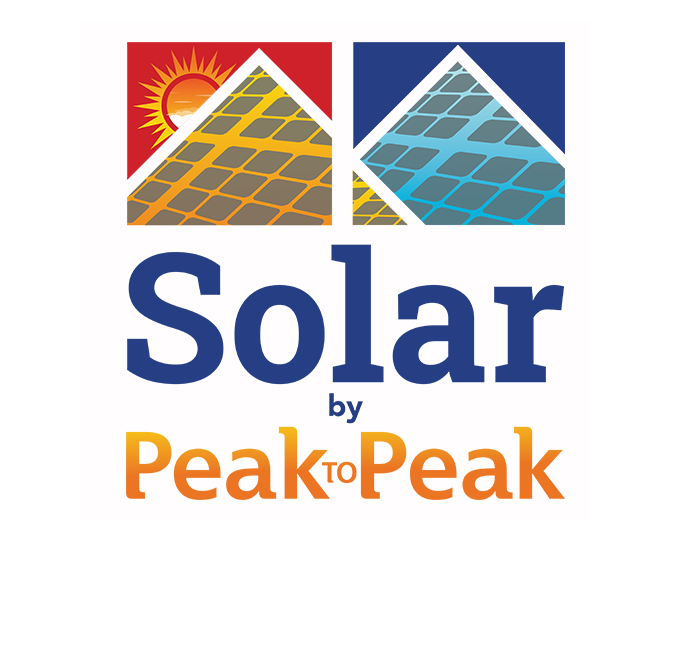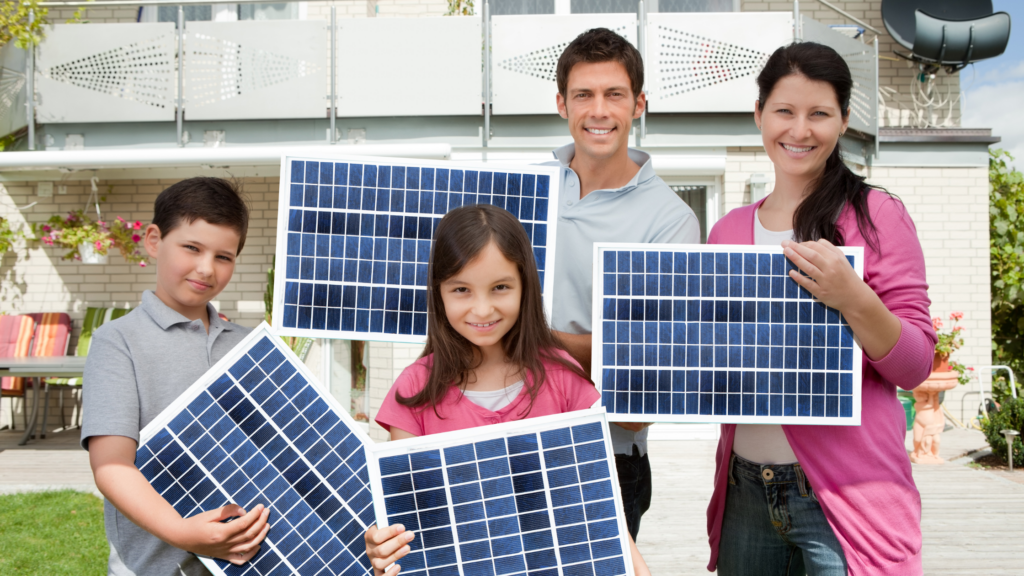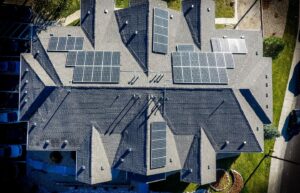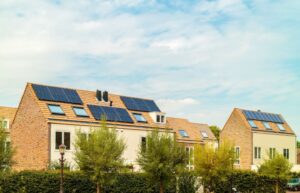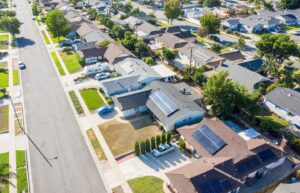Are you wondering which solar panels provide the best energy savings and energy efficiency for your home in Denver, Colorado? We understand that finding the right solar panels with high and maximum efficiency can be daunting, especially with the rapid advancements in PV cell technology and the desire to reduce energy costs. But fret not, as we’ve got you covered!
By staying informed on the latest advancements in solar panel technology, such as SunPower panels, you can make an informed decision and harness clean, renewable energy for your home. These residential panels use advanced PV cell technology to maximize electricity production. Not only will residential solar power contribute to a greener environment, but it can also significantly reduce your energy bills over time. Solar installation with solar cells is the key.
With our comprehensive guide, you’ll discover how solar panels can provide energy savings for your home through improved energy efficiency. Learn about the best options tailored to your needs, including the latest advancements in PV cell technology and equipment. So let’s dive in and unravel the world of solar panels, specifically PV cells, together! We’ll explore how these PV cells can generate energy savings by harnessing the power of the sun.
Determining the Efficiency of Solar Panels
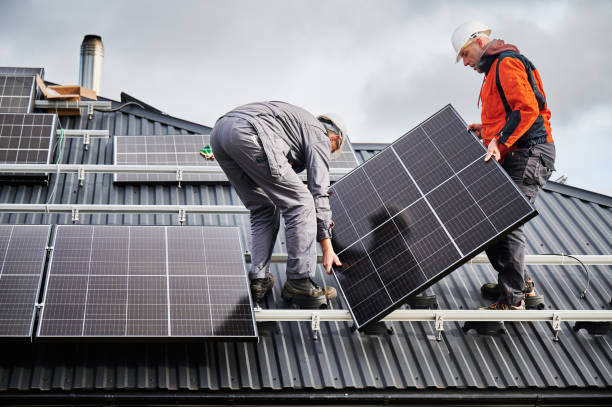
Solar panels have become an increasingly popular choice for homeowners looking to harness renewable energy and reduce their carbon footprint. One crucial factor to consider is efficiency. Understanding how energy savings and cost efficiency are measured in the industry and why they matter can help you make an informed decision.
Let’s explore some key points that will help you determine the efficiency of PV cells. PV cells rely on irradiance to generate power. Understanding how these components work together is crucial to evaluating the efficiency of solar panels. Examining the equipment used in PV cell installations gives you valuable insights into their overall performance.
How is Efficiency Measured, and Why Does it Matter?
Solar panel efficiency refers to the amount of sunlight that can be converted into usable electricity using solar panels and PV cells. The efficiency is determined by the level of irradiance or the amount of sunlight that reaches the panels and how well the PV cells convert that sunlight into electricity.
Solar panel efficiency is typically expressed as a percentage, representing the portion of solar irradiance that can be transformed into electrical energy for residential solar power. Higher efficiency in solar panels means that more solar irradiance can be converted into power, resulting in greater energy production for solar customers. This is why it’s important to choose the best solar panels for maximum energy output.
Efficiency matters in the solar power industry because it directly impacts your solar panel cells’ performance, output, and temperature. The more efficient your solar panels are, the more solar energy they will generate from the same amount of solar irradiance. This means that solar customers can produce more power from their panels. This translates into increased energy savings and a shorter payback period for solar customers investing in the best solar panels with high solar panel efficiency, resulting in more power.
Factors Affecting Solar Panel Efficiency
Several factors can influence the power and efficiency of solar cells in the solar industry, including temperature and shading.
High Temperatures
High temperatures can decrease the efficiency of the best solar panels, impacting their performance and the power they generate for solar energy customers. Therefore, it’s important to consider the average temperature factor when installing solar panels in locations with hot climates like Denver, Colorado. The power generated by the cells can be affected by the high temperature.
Shading
Shading is another critical consideration, as even partial shading on a solar panel significantly reduces its overall power and efficiency. The temperature of the cells can also be affected by shading, further impacting their average performance. Shadows from trees or nearby buildings can impact your solar cells’ power and average energy production, especially during peak sun hours and varying temperatures.
Types of Efficiency Ratings for Solar Panels
When evaluating solar panel options, you’ll come across various types of efficiency ratings, including temperature, average, and cells.
- Average Panel Efficiency: This rating indicates the overall average efficiency level achieved by a particular brand or model in converting solar energy into electricity, considering factors such as temperature and the type of cells used.
- Maximum Efficiency: This rating represents the highest achievable efficiency level under ideal conditions for average temperature, solar energy, and cells.
- Average Efficiency Ratings: These ratings provide an average efficiency value for different types of cells across a range of real-world conditions, accounting for factors like temperature and shading.
When evaluating a solar panel’s performance in various scenarios, it is crucial to take into account its maximum and average efficiency ratings. This consideration helps us understand how the panel functions under different temperature conditions and cell types.
Tips for Maximizing Solar Panel Efficiency
To ensure you maximize the efficiency of your solar panel system, consider the following tips for optimizing temperature and cell type:
- Optimize Placement: Install solar panels in areas with maximum exposure to sunlight and a suitable temperature, avoiding any potential shading that could affect the average output of the cells.
- Regular Maintenance: Keep solar panels clean and free from debris or dust that may hinder the performance of the photovoltaic cells. Maintaining an average temperature is important for optimal functioning, regardless of the type of solar panel used.
- Monitor Energy Consumption: Implement energy-efficient practices within your home to reduce the average consumption of cells, allowing your solar panels to meet a greater portion of your needs.
By implementing these strategies, you can enhance the efficiency and effectiveness of your solar panel system, ultimately leading to greater energy savings. These strategies involve optimizing the performance of the solar cells, improving the average output, and selecting the right type of panels for your needs.
These strategies involve optimizing the performance of the solar cells, improving the average output, and selecting the right type of panels for your needs. Determining the average efficiency of solar panels is crucial when making an informed decision about which type of cells are best suited for your needs.
Factors to Consider When Choosing Solar Panels
Colorado has several important factors to consider. From evaluating your energy needs to assessing installation requirements, these considerations will help you make an informed decision that suits both your budget and the area’s specific weather conditions. Additionally, it’s important to consider solar panel efficiency, the type of cells used, and the average performance.
Evaluate Your Energy Needs and Determine the Appropriate Size of a Solar Panel System
Before diving into the world of solar panels, it’s crucial to evaluate your energy needs and understand the different types of cells available. Take into account your average monthly electricity consumption, panel efficiency, and any potential changes in usage patterns in the future. Also, consider the type of cells used. This evaluation will help you determine the appropriate solar panel system size for your home in Denver, CO. The evaluation takes into account the type and number of cells needed for optimal performance.
Options When it Comes to Panel Sizes and Cells
- Standard-sized cell panels: These cells are commonly used and come in various dimensions.
- Compact-sized panels with cells: These smaller panels are perfect if you have limited roof space or specific aesthetic preferences.
Consider Your Budget and Compare Prices From Different Manufacturers
Solar panel prices can vary significantly depending on factors such as brand reputation, quality, warranty coverage, and additional features. Before starting your search for solar panels, it is crucial to set a realistic budget. This will help you find the right solar cells for your needs.
To find the best deal within your budget range,
- Research different manufacturers: Compare prices from reputable manufacturers who offer products with proven track records in cell and panel efficiency.
- Request quotes: Reach out to multiple installers in Denver, Colorado, for detailed quotes that include all associated costs (installation fees, permits, etc.) and information on panel efficiency and cells.
Remember that while price is an important consideration, it should not be the sole determining factor when choosing solar cells. When considering solar panels, it is important to take into account their quality and long-term performance, as well as panel efficiency and the quality of the cells used.
Assess Installation Requirements And Compatibility With Your Home’s Structure
Solar panel installation involves mounting solar panel systems on your Colorado roof or, in some cases, on the ground. Before making a decision, assess the installation requirements and compatibility of the panel’s efficiency with your home’s structure. Also, consider the compatibility of the cell with your home’s structure.
Considerations
- Roof orientation and tilt: Solar panels are most effective when they face south and have an optimal tilt angle for cell efficiency. Assess whether your roof meets these criteria.
- Structural integrity: Ensure that your roof can support the additional weight of solar panels and withstand the stress on their cells. Consult with a professional installer to evaluate this aspect.
Types of Solar Panels and Their Pros and Cons
In Colorado, there are several options to consider. Each type of cell panel has its own advantages and drawbacks that you should be aware of before making a decision.
Monocrystalline Solar Panels
Monocrystalline solar panels are known for their high efficiency and sleek appearance. They are made from a single crystal structure, which allows them to capture more sunlight and convert it into electricity. These panels are made up of individual solar cells that work together to generate power.
The cell structure of monocrystalline panels is uniform and highly efficient, making them a popular choice for residential and commercial solar installations. These single-crystal cells have higher panel efficiency when converting sunlight into electricity compared to other types. These cell panels perform well in limited roof space scenarios as they generate more power per square foot compared to other cell options.
However, monocrystalline solar panels tend to be more expensive than their polycrystalline counterparts. The manufacturing process involved in creating the single crystal structure contributes to the higher cost of cell panels and their efficiency. These cell panels can also be sensitive to temperature changes, which may affect their performance in extreme climates like Denver.
Polycrystalline Solar Panels
Polycrystalline solar panels are another popular option for residential solar installations in Denver. These panels utilize multiple silicon cells to convert sunlight into electricity. They are made from multiple silicon crystals melting together, resulting in a lower-cost alternative than monocrystalline solar panels. These solar panels use photovoltaic cells to convert sunlight into electricity. Polycrystalline solar panels, also known as solar cells, offer good efficiency levels and perform well under various climate conditions.
One drawback of polycrystalline solar panels is that they have slightly lower efficiency compared to monocrystalline ones. This is because the polycrystalline cells used in these panels are not as efficient as the monocrystalline cells. This means you may need more roof space to achieve the same energy output as with monocrystalline cell panels. However, if you have ample roof space available or want a cost-effective option without compromising on performance, polycrystalline panels can be an excellent choice.
Thin-Film Solar Panels
Thin-film solar panels utilize a different technology compared to crystalline panels. Thin layers of photovoltaic material are deposited onto a substrate to create lightweight and flexible solar panels, which significantly improve cell efficiency. Thin-film cell panels are less expensive to produce, making them an attractive option for budget-conscious homeowners.
One advantage of thin-film panels is their ability to perform well in low-light conditions, such as cloudy weather or shaded areas. However, they have lower efficiency levels compared to crystalline panels, requiring more roof space to generate the same amount of electricity. Their lower efficiency may result in higher installation costs due to the need for additional panels.
Bifacial Solar Panels
Bifacial solar panels are a relatively new addition to the market but offer unique advantages. These panels can generate electricity from both sides by capturing sunlight reflected off surfaces like the ground or nearby buildings. This feature increases their overall energy production potential.
The main drawback of bifacial panels is that they require specific mounting configurations and careful consideration of their surroundings for optimal performance.
Importance of Warranty and Durability in Solar Panels
Investing in solar panels is a significant decision that requires careful consideration. With the wide range of panel efficiency options available, it’s essential to assess various factors before making a choice. One crucial aspect to focus on is the warranty coverage and durability of the solar panels.
Why Warranty Coverage Matters
When you purchase solar panels, you want them to perform optimally for an extended period of time. This is where warranty coverage plays a crucial role. A comprehensive warranty ensures that you have long-term peace of mind by protecting your investment in panel efficiency against any unexpected issues or defects.
Warranties typically cover different aspects of solar panel performance and lifespan. Before making your decision, it’s important to understand the warranty coverage for panel efficiency. Some common types of warranties include:
- Product Warranty: This type of warranty guarantees that the solar panel itself is free from manufacturing defects.
- Performance Warranty: Performance warranties ensure that the panels will generate a certain percentage of their rated power output over a specified period.
- Labor Warranty: Labor warranties cover installation-related issues or defects, ensuring the panel’s efficiency is not compromised.
Factors to Consider for Durability
Durability is another critical factor when evaluating solar panels. You want the panels’ efficiency to withstand various weather conditions while maintaining optimal performance throughout their lifespan. Consider these key durability factors when choosing solar panels:
- Weather Resistance: Solar panels should be able to endure harsh weather conditions, including extreme temperatures, hailstorms, and heavy snowfall.
- Lifespan: Look for panels with a long lifespan to ensure they continue generating electricity efficiently for years to come.
- Manufacturer Reputation: Research manufacturers with a strong reputation for producing high-quality and durable solar panels. This can provide assurance that you are investing in a reliable product.
Selecting Reliable Brands
To ensure you choose the best solar panels for your needs, it’s crucial to consider both warranty coverage and durability. Look for reputable brands that offer comprehensive warranties with favorable terms. Some factors to keep in mind when evaluating brands include:
- Warranty Term: Check the length of the warranty period offered by each brand. Longer warranty terms indicate greater confidence in their products.
- Production Warranty: Consider the production warranty, which guarantees a certain level of electricity production over a specified number of years.
- Brand Reputation: Research customer reviews and industry ratings to gauge the reliability and reputation of different solar panel manufacturers.
Identifying the Most Efficient Solar Panels in 2023
As we enter 2023, staying updated on the cutting-edge technologies that are driving increased efficiency in solar panels is crucial. With advancements happening at a rapid pace, it can be challenging to determine which are the best solar panels for your needs.
Efficiency Ratings
One of the key factors to consider when evaluating solar panels is their efficiency rating. This rating indicates how effectively a panel converts sunlight into electricity. The higher the efficiency rating, the more power you can generate from a given area of space.
Some of the best solar panels in terms of efficiency have achieved ratings above 20%. These high-efficiency panels are typically produced by renowned manufacturers who invest heavily in research and development.
In recent years, multi-junction cells have emerged as an exciting innovation in the field of solar technology. These cells consist of multiple layers that capture different portions of the sunlight spectrum, allowing for greater energy conversion efficiency. By utilizing advanced materials and precise engineering techniques, manufacturers have been able to achieve impressive efficiency levels with multi-junction cells.
Passivated Emitter Rear Cell Technology
Another significant advancement is PERC (Passivated Emitter Rear Cell) technology. PERC cells feature an additional layer at the rear surface that improves light absorption and reduces electron recombination losses. This enhancement leads to higher overall efficiencies compared to traditional solar cell designs. As PERC technology becomes increasingly widespread, it is becoming a standard feature in many high-efficiency solar panels.
While efficiency is undoubtedly important when selecting solar panels, it is also essential to strike a balance with other factors. Factors such as cost, durability, warranty terms, and compatibility should also be considered before making a decision. Opting for highly efficient panels might initially come with a higher price tag but could save you more money in the long run due to increased energy production.
When searching for the best solar panels, it is advisable to research and compare different manufacturers. Look for customer reviews, independent testing results, and certifications to gauge the overall quality of the panels. Consider reaching out to local solar installation companies in your area, such as those in Denver, Colorado, who can provide expert advice based on their experience with various panel brands.
The Best Solar Panels: Solar By Peak to Peak
Solar panels are an essential component of any residential solar system, harnessing the power of the sun to generate clean and renewable energy. Coloradoans, look no further than Solar by Peak to Peak. With their exceptional quality and reliability, high-efficiency design, extensive warranty coverage, and commitment to sustainability, Solar by Peak to Peak is a trusted brand that stands out from the competition.
Explore Exceptional Quality and Reliability
Solar by Peak to Peak offers solar panels that are known for their exceptional quality and reliability. Their panels are designed using advanced PV cell technology, such as SunPower panels, which have proven to be highly efficient in converting sunlight into electricity. With Solar by Peak to Peak’s solar panels installed on your roof space, you can trust that you are investing in a reliable, long-lasting renewable energy solution.
Benefit From High-Efficiency Panels
One of the key advantages of choosing Solar by Peak to Peak is their focus on high-efficiency panels. These panels are specifically designed to maximize energy production, allowing you to generate more electricity from your solar system compared to other panel brands.
By utilizing cutting-edge PV cell technology and innovative engineering techniques, Solar by Peak to Peak ensures that their panels deliver outstanding performance while occupying minimal roof space or panel area.
Enjoy Extensive Warranty Coverage and Exceptional Customer Support Services
When investing in solar panels, it is crucial to consider warranty coverage and customer support services. Solar by Peak to Peak understands this need and offers comprehensive warranty coverage for their products.
This means you can have peace of mind knowing that your investment is protected against potential defects or issues. They provide exceptional customer support services throughout the installation and maintenance processes, ensuring that you have a hassle-free experience with your solar system.
Choose a Trusted Brand Committed to Sustainability
Solar by Peak to Peak is not just focused on providing high-quality solar panels; they are also committed to sustainability and environmental responsibility. By choosing their panels, you are supporting a brand that actively contributes to reducing carbon emissions and promoting renewable energy adoption.
Solar power is an eco-friendly alternative to traditional electricity generation methods, and Solar by Peak to Peak is dedicated to making this clean energy source accessible for homeowners in Denver, CO.
Conclusion: Which are the Best Solar Panels?
Alright, so now you know all about solar panels and what to consider when choosing the best one for your needs.
We’ve covered everything from efficiency and durability to different types of panels and even reviewed the top options for 2023. But which solar panels come out on top? Well, after careful research and comparison, we can confidently say that Solar by Peak to Peak offers the best solar panels.
With its high efficiency, excellent warranty coverage, and durability, Solar by Peak to Peak checks all the boxes. They have consistently proven themselves as a reliable choice in the market. So if you’re looking to harness the power of the sun and reduce your carbon footprint, give Solar by Peak to Peak serious consideration.
